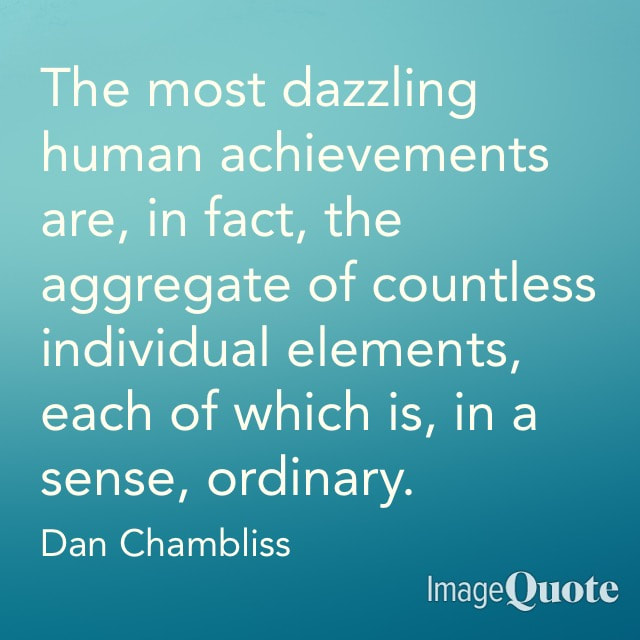|
The other day I had the great privilege and honor to have lunch with one someone I have a great deal of respect and admiration for, Dr. Dan Chambliss. I’ve met with Dr. Chambliss on two previous occasions. In our previous meetings I felt a bit star struck and ill prepared for our conversations. I was more than ready today.
A couple of weeks ago I Tweeted a quote by Dan taken from his book about developing Olympic swimming champions. To my surprise, he suggested we get together for lunch. I wasn’t going to let this opportunity pass by. I drove two hours from Rochester to Hamilton to discuss mundane things. I still haven’t figured out why his book on Olympic swimmers fascinates me so much. I never swam competitively. I took swimming lessons until 8th grade, never competed in a race, and yet I find the notion of mundanity to interesting and mysterious at the same time. The mystery lies in the mundane. The most dazzling human achievements, as Dr. Chambliss states, are in fact the aggregate of countless individual elements, each of which is, in a sense, ordinary. And yet, these daily and ordinary tasks are the building blocks for future success. Similar to the construction of a house analogy, you need to have a strong base in order to support the weight of the house, we need to complete ordinary tasks on a daily, weekly, monthly, and yearly basis in order to establish a firm, supportive, and resilient base to achieve athletic success. Much like the swimmers in Mission Viejo, California in 1984, their “secret” lay in their completion of daily tasks that others may have found boring, not important, or simply not willing to do. It takes a dedicated, motivated, and gritty person to get up every morning and swim six miles before going to school, and then coming back later that afternoon and doing it again. Mastering technique. Mastering turns. Mastering every little aspect of swimming. Being deliberate before deliberate was really researched by Dr. Ericsson and Dr. Duckworth. Everyday. 365 days a year. For multiple years. Maybe dedicated isn’t the right word. The roots seep deeper than sheer dedication. As I mentioned, I was prepared today. Still a little star struck. I mean, it isn’t every day that you get the chance to eat lunch with one of the most respected and often cited Sociologist of the last 30 years. Our conversation today, much like our previous two meetings, began with me asking Dr. Chambliss questions that he has probably been asked hundreds of times before, especially about his Olympic swimming. Today, however, I asked him a question that he probably hasn’t been asked as often. I asked him if his theory of mundanity could be replicated in 2018. I could tell by the look on his face that this probably wasn’t something he has often been asked. Could the mundanity of excellence theory be tested with Olympic throwers? We spent a great deal of time talking about coaching; philosophies, how to work with individual athletes, expectations, and goals. My biggest takeaway from today is this-it is ok to coach athletes, in my case throwers, who do not have the drive to be Olympic champions! Let me explain. I shared a situation I previously had with an athlete. This particular athlete shared his very lofty goals with me. However, the athlete did not complete the tasks necessary to achieve their goals. In fact, the athlete didn’t do much of anything that would have led to achieving those goals. They failed to live up to their end of the stated goals. I told Dr. Chambliss that I spoke to the athlete about it, in which I shared that they did not complete any of the minimal tasks necessary to achieve their goals. Dr. Chambliss told me I handled to situation poorly. He shared a similar story with me. One in which he wanted the athlete to perform up to a certain standard and expectation. One in which he, as someone told him, wanted more than the athlete. Instant light bulb moment for me. I have had other coaches share similar stories with me, but it didn’t click until today. He told me that it was ok for the athlete to not do what they needed in order to achieve their goal. That, in the bigger picture, wasn’t really a big deal. He said, rather than try to focus on the one athlete, create a culture that is built to support the bigger goals of the athletes that are doing everything in their power to achieve them. It is ok to not reach your goals, he told me, but that it is also ok to focus my attention on the athletes who are working towards their goals. He explained that because he wanted the see the athlete succeed more than they did, it in fact negatively affected their relationship. The athlete, in this case a 12-year old female swimmer, who had all the talent in the world, didn’t like to work hard. Thus, in her case, her genetic talent alone was going to carry her only so far. Unfortunately, she ended up quitting a couple years later. He wanted for her to be successful more than she wanted the success for herself. An a-ha moment for me. When athletes and I discuss their goals and commitments to throwing and track & field at the beginning of the season, we discuss them together. It is a partnership. We need to meet each other half way in order for the success to happen. In the past, much like some other coaches out there, I’m guessing that they may take it personally when an athlete doesn’t achieve their goal. I have. I do. I have always felt that it was my ultimate responsibility when an athlete didn’t accomplish something. Regardless of what was going on in their life, I thought I could will them to achieving what they wanted to achieve. Most recently, that hasn’t been the case. Now I know why. It is ok to set a goal and not achieve it. Maybe their judgement was clouded. Maybe the athlete thought they wanted to achieve that specific goal, until they realized that maybe they weren’t willing to do what it took to actually achieve it. Maybe I shouldn’t take it personally anymore. We also talked about life and research. We talked about the life/research balance. We discussed future research. We discussed mundanity. I asked Dr. Chambliss if I could start researching mundanity. Mundanity specific to throwing. I couldn’t think of a very clever way to do so besides just asking. He said yes! I think part of my fascination comes from the fact that I know Olympic throwers, have their contact information, and have competed against them at one time or another. You can’t do that with the four major sports. I’ll probably never catch a pass from Tom Brady, or ever face Justin Verlander while standing in the batter’s box. I can say that I competed in many hammer competitions with multiple time Olympians (AG Kruger and Kibwe Johnson). Their success isn’t a mystery. There isn’t really a secret. They were able to sustain their success. That is what I’m most interested in learning more about. How are these elite athletes able to sustain their success? Can the mundanity of excellence theory be tested with Olympic throwers? We’ll soon find out!
0 Comments
Leave a Reply. |
Dr. Charles InfurnaCharles Infurna, Ed.D., is the owner and lead coach of Forza Athletics Track Club. Dr. Infurna has coached National Record Holders, National Champions, All-Americans, and Conference Champions at the Post-Collegiate, Collegiate, and High School level. Archives
January 2023
Categories |



 RSS Feed
RSS Feed